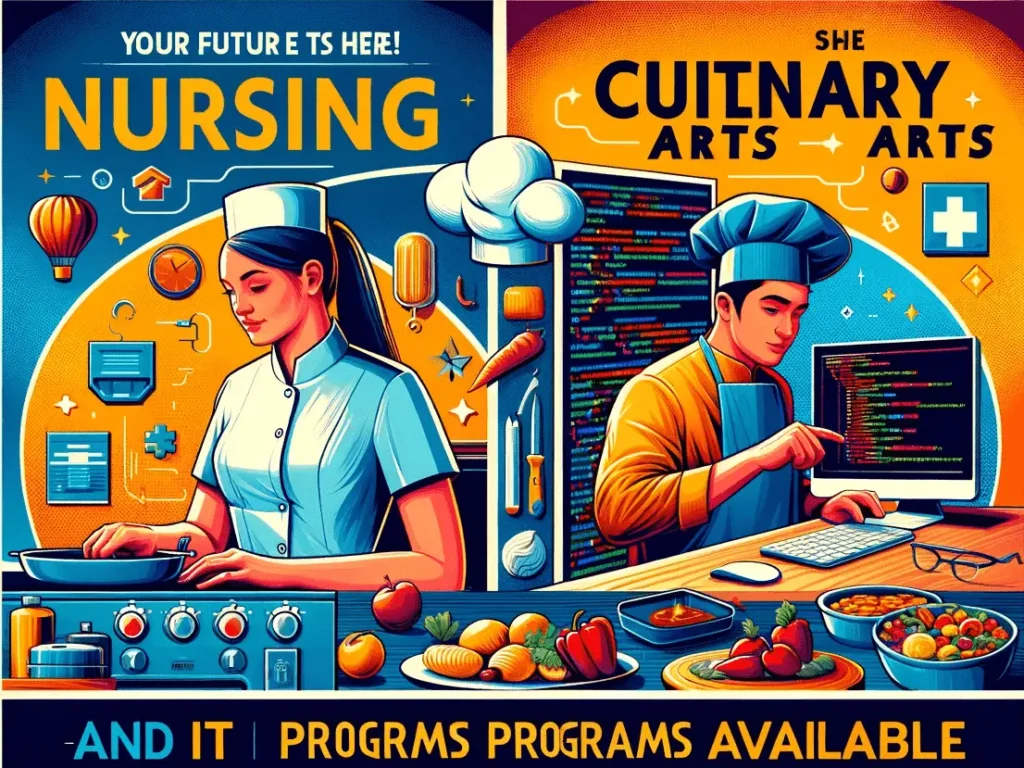When it comes to pursuing a career through trade school, one of the critical factors to consider is the duration of the programs. Trade schools offer diverse options, from short-term certificates to longer, more comprehensive programs. In this article, we’ll explore the various program durations, including short-term, medium-term, and long-term options, to help you make an informed decision about your educational journey.
Short-Term Trade School Programs (Usually 2 Weeks to 6 Months)
1. Welding Certification
-
- Duration: Typically 3-6 months.
-
- Curriculum: Welding techniques, safety procedures, and hands-on training.
Welding certification programs equip students with the skills needed for careers in construction, manufacturing, and repair industries. Graduates often find work as welders, fabricators, or pipefitters.
2. Electrician Assistant
-
- Duration: Approximately 6 months.
-
- Curriculum: Basic electrical theory, wiring techniques, and practical training.
Electrician assistant programs prepare students for entry-level positions in the electrical industry. Graduates assist licensed electricians with installations, repairs, and maintenance.
3. Medical Billing and Coding
-
- Duration: Typically 6-12 months.
-
- Curriculum: Healthcare terminology, coding systems, and insurance procedures.
Medical billing and coding programs focus on the administrative side of healthcare. Graduates work in medical offices, hospitals, and insurance companies, ensuring accurate billing and coding practices.

Medium-Term Trade School Programs (Around 1 Year)
1. HVAC Technician
-
- Duration: Approximately 12-14 months.
-
- Curriculum: Heating, ventilation, air conditioning systems, and troubleshooting.
HVAC technician programs train students to install, maintain, and repair HVAC systems. Graduates often work for HVAC companies or become self-employed technicians.
2. Dental Assistant
-
- Duration: Typically 9-12 months.
-
- Curriculum: Chairside assisting, patient care, and dental office procedures.
Dental assistant programs prepare students to work alongside dentists, providing chairside assistance and administrative support in dental practices.
3. Automotive Technician
-
- Duration: Around 12-18 months.
-
- Curriculum: Vehicle diagnostics, repair techniques, and automotive technology.
Automotive technician programs cover a wide range of automotive systems, preparing graduates for careers in auto repair shops, dealerships, or as independent mechanics.
Long-Term Trade School Programs (2 Years or More)

1. Nursing (Licensed Practical Nurse or Registered Nurse)
-
- Duration: Typically 2-4 years, depending on the level of nursing pursued.
-
- Curriculum: Nursing theory, clinical practice, and healthcare ethics.
Nursing programs lead to licensure as either a Licensed Practical Nurse (LPN) or a Registered Nurse (RN). Graduates work in hospitals, clinics, and various healthcare settings.
2. Culinary Arts
-
- Duration: Around 2 years.
-
- Curriculum: Culinary techniques, food preparation, and kitchen management.
Culinary arts programs provide aspiring chefs with the skills needed to work in restaurants, hotels, or catering companies.
3. Information Technology (IT) Bachelor’s Degree
-
- Duration: Typically 4 years.
-
- Curriculum: Computer science, programming languages, and IT management.
IT bachelor’s degree programs offer in-depth knowledge of computer systems and technology. Graduates pursue careers as network administrators, software developers, or IT managers.
Comparing Trade Schools to Traditional Colleges
While trade schools offer unique advantages, it’s essential to compare them to traditional colleges to make an informed decision about your education.
Time Investment
-
- Trade Schools: Trade school programs are typically shorter, allowing you to enter the workforce more quickly.
-
- Traditional Colleges: Four-year college programs require a more extended time commitment.
Cost-Efficiency
-
- Trade Schools: Trade school tuition is often lower, reducing the overall cost of education.
-
- Traditional Colleges: Four-year colleges may involve higher tuition expenses and additional years of study.
Employability and Career Prospects
-
- Trade Schools: Trade school graduates are job-ready and often in demand for specific skilled professions.
-
- Traditional Colleges: Traditional college graduates may need additional training or certifications, depending on their field of study.
Virtual Trade School Programs: A Modern Option
With the advancement of technology, virtual trade schools have gained popularity. These online programs offer flexibility and accessibility for individuals seeking career-focused education. The duration of how long is trade school programs may vary, but they typically follow the same short, medium, or long-term structure as traditional programs.
Virtual Trade School Marketing
Marketing virtual trade school programs plays a crucial role in attracting students. Here are some strategies used by virtual trade schools:
-
- Online Advertising: Virtual trade schools use online advertising on platforms like Google Ads and social media to reach potential students.
-
- Search Engine Optimization (SEO): Optimizing their websites for search engines helps virtual trade schools appear in search results when prospective students look for relevant programs.
-
- Content Marketing: Producing informative blog posts, videos, and webinars that provide value to potential students can help build trust and credibility.
-
- Email Campaigns: Sending targeted emails to individuals interested in trade school programs can be an effective way to engage with prospective students.
-
- Social Media Engagement: Virtual trade schools actively engage with their audience on social media platforms, answering questions and sharing success stories.
Choosing the Right Trade School Program
To make an informed decision about the duration of your trade school program, consider the following:
Identify Your Career Goals
Begin by defining your career objectives. Determine the specific field you wish to enter and whether a short-term, medium-term, or long-term program aligns with those goals.
Evaluate Program Curriculum
Examine the curriculum of the program you’re interested in. Ensure it covers the essential skills and knowledge required for your chosen profession.
Research Job Market Demand
Investigate the demand for professionals in your desired field. A program’s success is often measured by the job opportunities available upon graduation.
Financial Planning
Explore financial aid options, scholarships, and grants to make your education more affordable. Calculate the overall cost of the program, including tuition, materials, and living expenses.
Program Reviews
Read reviews and testimonials from students who have completed the program you’re interested in. Their experiences can provide valuable insights into program quality and outcomes.
In conclusion, the duration of trade school programs varies widely, offering options ranging from a few weeks to several years. The right choice for you depends on your career goals, interests, and the level of specialization you seek. Before enrolling, carefully research your chosen field and the trade school programs available to ensure you embark on a successful and rewarding educational journey.
